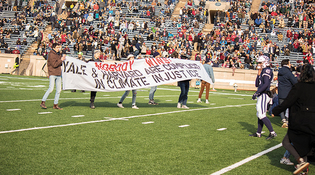 loading
loading
Light & VerityClimate protest delays The GameFifty people were arrested for occupying the field at the close of halftime.  Marisa Peryer/Yale Daily NewsView full imageAlthough the 136th Yale-Harvard football game on November 23 ultimately became one for the ages, with a 50–43 double-overtime win by the Bulldogs (see page 68), the athletic action was nearly overshadowed by a political action. Just as halftime was ending, a group of about 70 climate-change activists from both Harvard and Yale took to the field with protest signs and refused to leave. Their action delayed the game—which was being televised live on ESPNU—by 48 minutes and garnered national attention. The group was joined by hundreds of spontaneous protesters from the stands. As the football teams waited out the delay in the locker rooms, the protesters ignored repeated calls from police and the public-address announcer to leave the field. The reaction in the stands was mixed, with some booing and some chants of support. Most of the crowd returned voluntarily to their seats, but 50 protesters were arrested (including the actor Sam Waterston ’62) and charged with disorderly conduct. They were sentenced to five hours of community service, after which the charges will be dropped. The protest was organized by the student groups Divest Harvard and Fossil Free Yale. In an essay posted on BuzzFeed, the groups wrote, “We believe the status quo, in which our schools profit from fossil-fuel extraction and extort communities on the front lines of the climate emergency, merits rising above an antiquated athletic rivalry. To that end, we took advantage of the visibility of the Game to advocate that Yale and Harvard divest from the fossil-fuel industry and instruct their fund managers to cancel their holdings in Puerto Rico’s debt.” On the day of the protest, Yale’s Office of Public Affairs and Communications released a statement that affirmed the university’s commitment to free expression but added that “the exercise of free expression on campus is subject to general conditions, and we do not allow disruption of university events.” The statement also approvingly quoted from an Ivy League statement that called it “regrettable that the orchestrated protest came during a time when fellow students were participating in a collegiate career–defining contest and an annual tradition when thousands gather from around the world to enjoy and celebrate the storied traditions of both football programs and universities.” In a statement on December 1, President Peter Salovey ’86PhD addressed the substance of the protest, noting Yale’s commitment to “addressing climate change substantively and relentlessly—and with increasing intensity” through teaching, research, and reducing the university’s own carbon footprint (see “Yale and the Climate,” page 58). Although the university does not support divestment, he wrote, Yale’s investment policy favors shareholder resolutions that call for companies to disclose how they address climate issues. Yale also instructs its managers not to hold companies that ignore the social and financial costs of climate change and “that fail to take economically sensible steps to reduce greenhouse gas emissions.”
The comment period has expired.
|
|